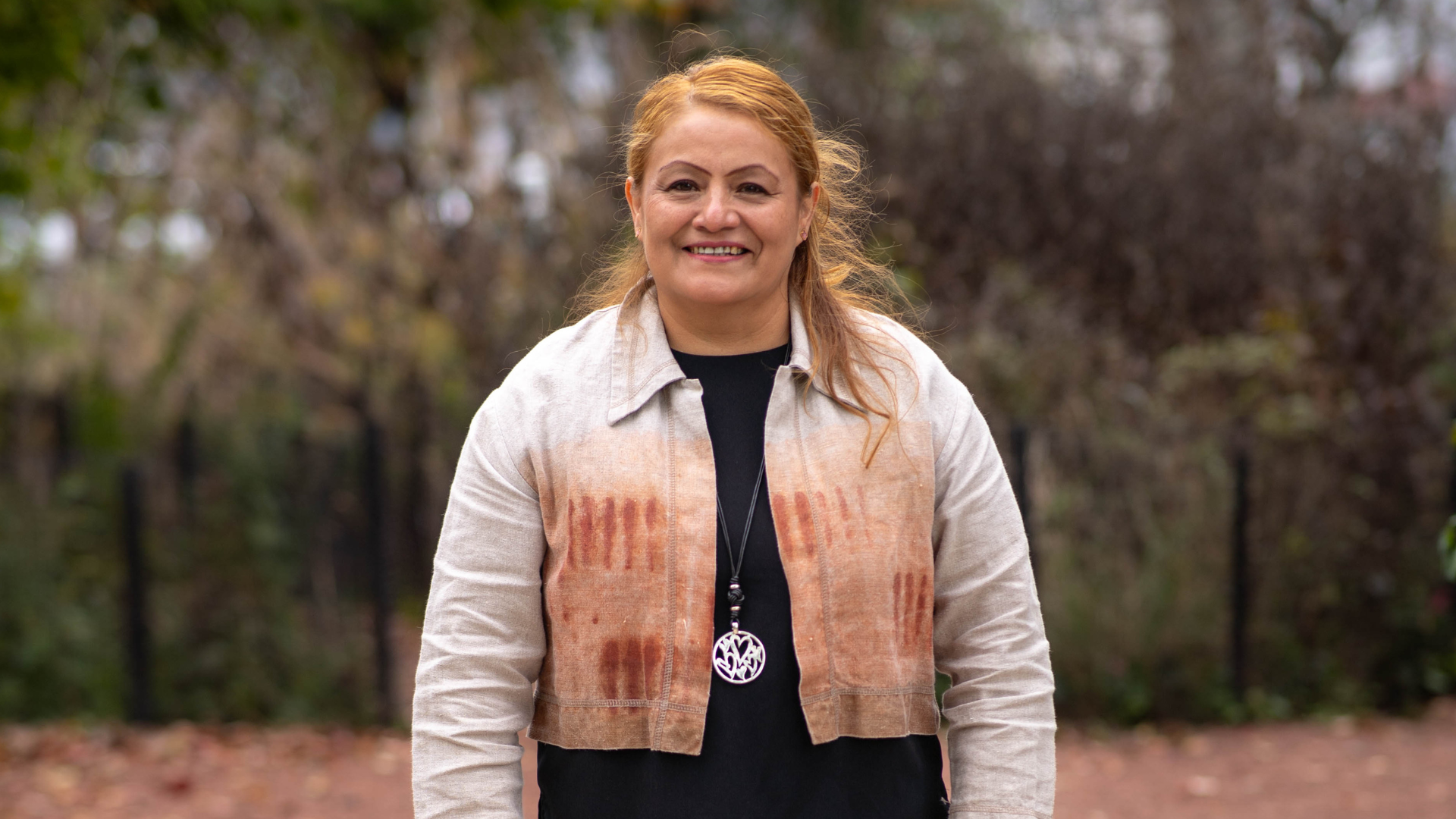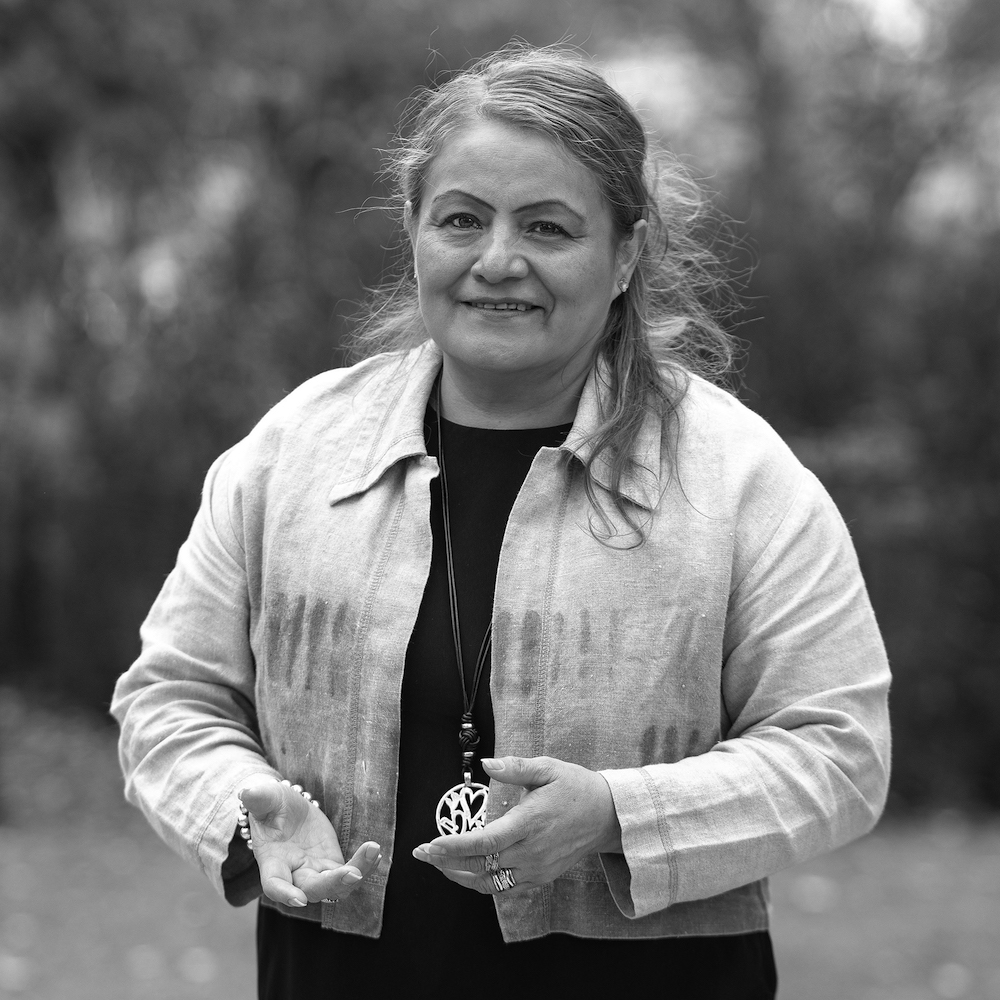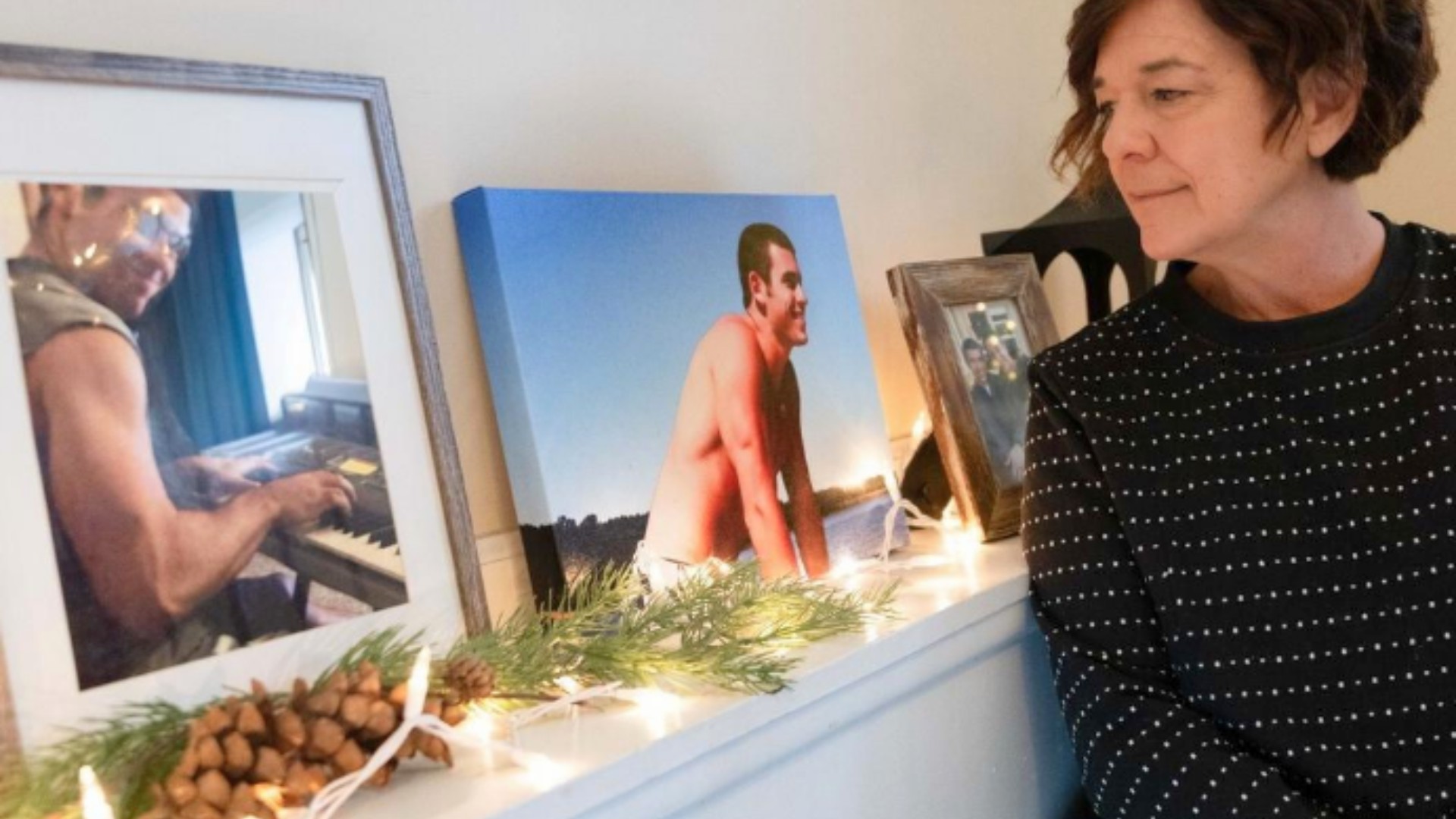Photos by Karl Soderstrom
Viviendo el Pacto del amor de Dios por mil generaciones.
Mi esposo, Sergio González, y yo llegamos a los Estados Unidos desde México en abril de 1992, cuando nuestra hija mayor, Meztli, tenía sólo seis meses de edad. Después de llegar a Chicago, Sergio y yo decidimos tomar clases de GED y fue tomando estas clases donde conocimos al pastor del Pacto, el reverendo Luis Retamal, quien fue nuestro profesor y posteriormente nuestro pastor. Logramos desarrollar una relación de amor y respeto con él.
El pastor Luis nos invitó a asistir a su iglesia, la Iglesia del Pacto Evangélico Grace. Mi familia en México siempre ha sido de un trasfondo católico por generaciones, pero al empezar a asistir a la iglesia de Grace mi vida cambió y acepté a Jesucristo como mi Señor y Salvador. Sergio y yo somos la primera generación de creyentes en nuestra familia. Mi esposo y yo sentimos un llamado al ministerio desde nuestros inicios en el evangelio y comenzamos a tomar clases de discipulado con el pastor Luis. Por un tiempo fuimos solo nosotros participando de estas clases, pero luego se convirtió en un grupo pequeño y este fue creciendo, donde después éramos nosotros impartiendo estas clases.
Dos años más tarde, llegó la oportunidad de plantar una iglesia al sur de Chicago y el pastor Luis nos animó a hacerlo. Fue así como nació la Iglesia del Pacto Evangélico Peniel. No teníamos ningún entrenamiento sobre cómo plantar iglesias y además no conocía a ninguna pastora latina como modelo a seguir; así que simplemente fui aprendiendo día a día. Cometí muchos errores, y estos errores me ayudaron a crecer y a solucionar problemas con los recursos que tenía.
Durante ese tiempo, comencé a tomar clases en CHET, con el propósito de prepararme y servir mejor a nuestra iglesia. Al recordar esos tiempos, siempre me sorprendo de lo que logramos. El saber mi valor en Cristo y lo que Dios espera de mí, siempre me ha dado fuerzas para continuar.
Sergio y yo sentimos el llamado de plantar otra iglesia y la Iglesia del Pacto Evangélico Vida Plena nace en el año 2008, desafortunadamente no pudimos continuar por complicaciones de salud física. El proceso de planta-ción de cada iglesia fue diferente. Usamos nuestros propios recursos financieros para continuar haciendo el ministerio en Vida Plena. Desarrollamos un equipo de trabajo familiar, mi hija menor, Citlalli, se convirtió en nuestra maestra de escuela dominical cuando era preadolescente, mi hijo, Tietl, se ocupaba de la tecnología y Meztli ayudaba con todo lo logístico y administrativo.
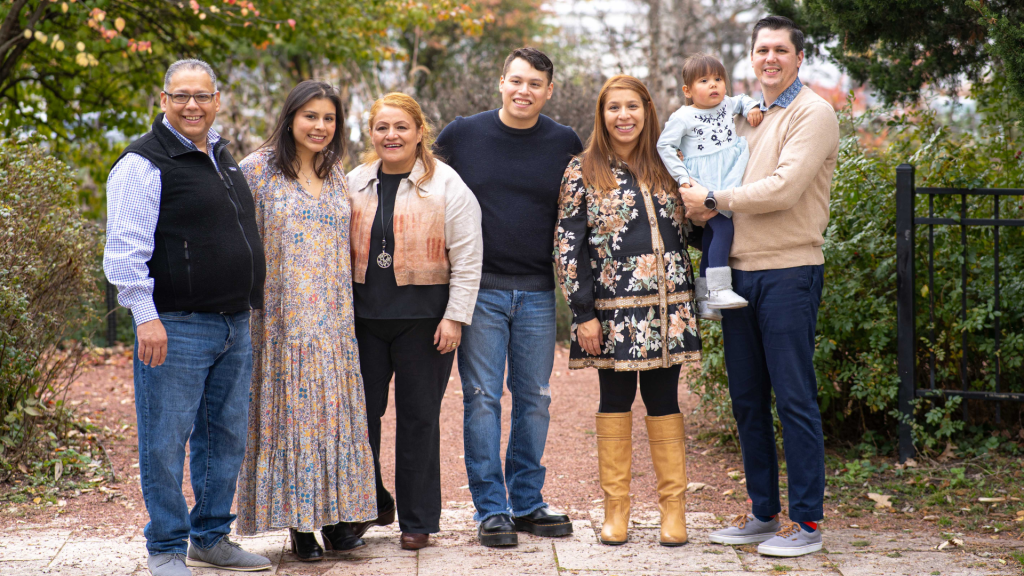
Sergio González (izquierda) y Dany Flores con sus hijos (de izquierda a derecha), Citlalli, Tietl, Meztli y su hija Natalia y su esposo Jordan Doles
Recibí mi diploma ministerial a través del Centro Hispano de Estudios Teológicos (CHET). Fui parte del primer grupo de estudiantes de CHET que tomó clases en el Seminario Teológico de North Park. Obtuve mi educación con el apoyo de mi esposo y mi familia mientras seguía trabajando a tiempo completo en mi trabajo secular. No fue fácil, pero nunca olvidaré que mi esposo y mis tres hijos me apoyaron cuando fui ordenada como pastora en Palabra y Sacramento (Word and Sacrament) en la Junta Anual de la Iglesia del Pacto en junio del 2011. Incluso en medio de dificultades idiomáticas y problemas con mi estatus legal, mis hijos y mi esposo me decían: “¡Sí, mamá! Tú puedes”.
El ser ordenada como pastora me ha abierto muchas puertas; al mismo tiempo me ha permitido ser un ejemplo y un modelo para animar a otras a prepararse y servir en el ministerio. La Iglesia del Pacto tiene y da acceso a recursos y oportunidades que podemos compartir entre nosotros. Tuve el privilegio de servir en la Junta del Ministerio de Orden y actualmente sirvo en la Junta Ejecutiva del Pacto. He aprendido mucho y he conocido a gente maravillosa. Le doy gracias a Dios por permitirme ser parte de reuniones que han sido difíciles y han representado un reto para mí, donde he salido de mi zona de comodidad. Le doy gracias a Dios por el llamado que ha hecho a mi vida y por las oportunidades que me ha dado de servir en lugares privilegiados. A veces todavía no puedo creer que sea una pastora latina ordenada. Estoy muy agradecida con Dios y muchas veces me he preguntado: “Dios, ¿qué viste en mí para darme todo esto?”
En mi contexto latino, he tenido dificultades como pastora. A veces la gente me saluda diciendo: “Hola hermana”, en vez de “pastora Dany”. Hay pastores de otras comunidades que se dirigen a mí como “pastora” pero en mi propia comunidad es complicado.
Cuando comparto nuestros planes para plantar una nueva iglesia, la gente de mi cultura pregunta: “¿El pastor Sergio va a plantar esta nueva iglesia?” “No”, digo, “no es solo él, los dos somos plantadores de iglesias”. Estamos en la primera etapa de plantar otra iglesia en el lado noroeste de Chicago. Sergio siempre ha sido el pastor principal, pero después de oración y de dirección espiritual hemos discernido que serviremos como co-pastores y esto me llena de emoción y alegría. Tenemos un equipo de 18 a 20 personas, cuatro familias que se han reunido en mi casa, comprometidas a trabajar con nosotros. Meztli y Citlalli, nuestras hijas, han sido un gran apoyo durante este proceso. Por ahora, es una congregación de habla hispana y estamos orando para que sea una iglesia multicultural.
Hemos visto a Dios dirigiéndonos y dirigiendo esta nueva plantación. En nuestra comunidad latina hay gene-raciones que dominan mejor el inglés y esperamos que conforme vayamos creciendo como plantación, desarrolle- mos espacio para nuestras generaciones.
Cuando comenzamos la segunda plantación de la iglesia, Vida Plena, nos reunimos en el sótano de nuestra casa todos los domingos. Pero después de reunir a unas 40 personas en nuestra casa estilo Tudor de Chicago, nos dimos cuenta de que teníamos que reunirnos en un lugar más grande. Hemos aprendido de esas experiencias y queremos comenzar esta nueva plantación en una buena ubicación donde podamos crecer y mantener límites saludables. He estado trabajando con la Conferencia Central durante un año para encontrar el lugar adecuado para reunirnos.
Por ahora nuestras reuniones consisten en un tiempo de alabanza y estudio bíblico. Conversamos sobre nuestras familias, nuestras vidas y otros temas, pero hemos notado otras necesidades dentro de nuestro equipo. Sergio ha iniciado una reunión de oración los miércoles por la mañana para orar por nuestros niños.
En el pasado solía hacer casi todo yo misma con mi familia, pero he aprendido que también debe haber una vida balanceada y saludable dentro del ministerio. En nuestro equipo hay personas claves con dones en las áreas que queremos enfocarnos, como el ministerio infantil y la salud mental.
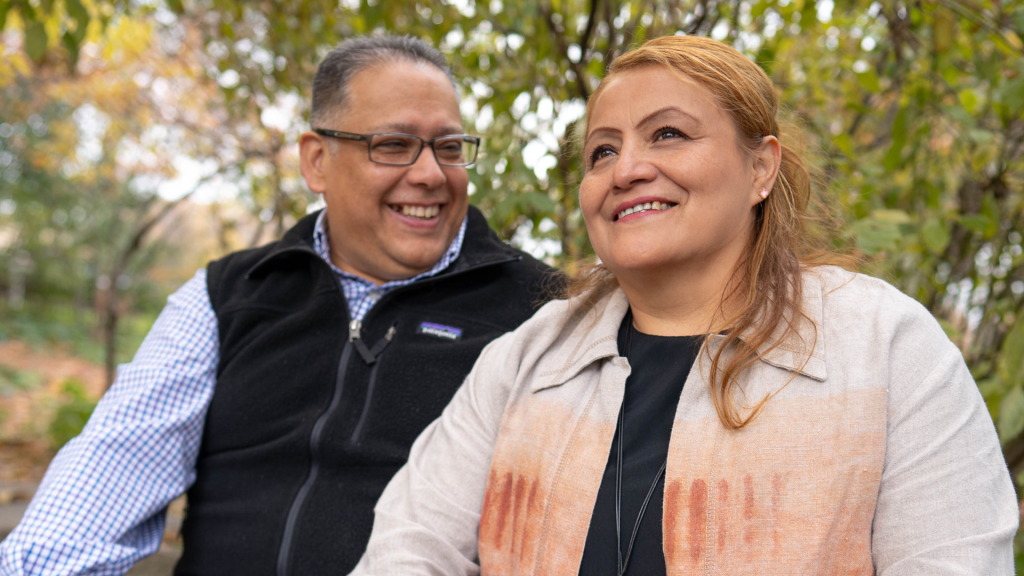
Sergio González y Dany Flores
Es muy común en nuestra cultura latina que la generación mayor simplemente dé órdenes a la genera-ción más joven en lugar de escuchar sus necesidades o deseos. Estamos tratando de encontrar un equilibrio en la medida que ministramos a esta nueva generación. Varios jóvenes de nuestro grupo principal tienen entre 19 y 26 años. Nos estamos esforzando por escucharlos y entenderlos bien. Sergio y yo hemos aprendido no sólo a hablar, sino también a escuchar bien.
Nuestra comunidad latina enfrenta a diario pro-blemas en el área de la salud mental. Algunos familiares de nuestro grupo principal han muerto por suicidio. Recientemente oficié un funeral y me han pedido que visite a personas en hospitales por problemas de salud mental. He estado orando y haciendo conexiones en el área donde vivo. Algunos miembros de nuestro equipo conocen grupos de apoyo y centros de salud mental, es muy importante para nosotros compartir estos recursos con nuestra comunidad. Me alegra saber que quizás podremos ofrecer ayuda y recursos, algo que no ha estado disponible para nosotros mismos.
Mi hija Meztli tiene el llamado al ministerio y actualmente está trabajando en su propuesta de tesis sobre cómo superar la desesperación y el dolor en la congregación latina. “Nos apresuramos a evitar el dolor y el lamento y pasar directamente a la celebración”, dice Meztli. “Tendemos a compartir nuestro dolor, pero lo concluimos con “pero estamos bien gracias a Dios”, y si bien hay algo de verdad en eso, debemos tener el espacio para poder llorar y lamentarnos. Este es un proceso importante para poder llegar a la celebración”.
Mi hija Citlalli ha impulsado fuertemente la creación de un ministerio de salud mental y ha tomado la iniciativa de contactar a profesionales y organizaciones que puedan trabajar estrechamente con nuestra iglesia. “La terapia o buscar asesoramiento sobre salud mental es un tabú en nuestra comunidad latina”, dice. “Hay mucho estigma y vergüenza cuando se trata de salud mental, y nos gustaría crear un espacio para conversar y ofrecer recursos para aquellas personas que los necesiten y así fortalecer y ayudar a nuestra comunidad”.
Citlalli también está creando un plan de estudios para nuestra iglesia que sea relevante y al mismo tiempo que sea bilingüe para el ministerio de nuestros niños. Ella planea graduarse con su licenciatura en biología de North Park en la primavera. Hay una frase popular en México, “Si se puede”. Les enseñé a mis hijos a no centrarse en lo que no teníamos sino en lo que sí tenemos. Sabiendo que puedes aprender algo de cada situación, a no tener miedo de fallar. Yo solía decirles a mis hijos: “¿Qué es lo peor que puede pasar? Fracasas… ¿y qué? Aunque era indocumentada y no tenía acceso a muchos recursos, aprendí a explorar alternativas para salir adelante. Ahora, cuando veo a alguien que necesita ayuda, puedo yo misma dar testimonio de la infinita gracia y amor de Dios. Mi hijo Tietl estará apoyando en el área de arte en la nueva plantación de iglesia.
De todos mis hijos, a Meztli se le cerraron muchas puertas por haber sido indocumentada. Citlalli y Tietl nacieron en Chicago. Cuando eran niños preguntaban: “¿Por qué es tan difícil para Meztli?” pero ahora que son adultos entienden la lucha y adversidades que enfrenta una persona indocumentada. Como muchos otros, Meztli tuvo que luchar constantemente por un lugar en la mesa. Cuando las cosas no le han salido bien, repite lo que les hemos dicho a nuestros hijos desde pequeños: “Si es para mí, me llegará. Si no, Dios debe tener algo mejor para mí”.
Meztli obtuvo su residencia legal permanente hace tres años. En el 2021 fue ordenada en Palabra y Sacramento en la Iglesia del Pacto. Actualmente se desempeña como directora de administración y comunicaciones en River City Community Church, una congregación del Pacto en Chicago. Analizando, creo que soy la primera pastora latina en el Pacto con una hija que también está ordenada, tal vez la única hasta ahora.
Miro a mis hijos y pienso en las luchas que han enfrentado al ser hijos de pastores, las luchas que seguirán enfrentando dentro de nuestra comunidad y las luchas que experimentan por ser parte de la comunidad latina. Me encanta la promesa que Dios nos hace sobre las bendiciones que otorgará a nuestras generaciones: “Reconoce, por tanto, que el SEÑOR tu Dios es el Dios verdadero, el Dios fiel, que cumple su pacto de generación tras generación, y muestra su fiel amor a quienes lo aman y obedecen sus mandamientos”. (Deuteronomio 7:9).
Hace cinco años obtuve mi residencia legal permanente en los Estados Unidos y este otoño solicité mi ciudadanía estadounidense. Ha sido un proceso largo y difícil, pero este país es mi hogar y veo cumplidas las promesas de Dios todos los días de mi vida. Tengo una nieta, Natalia, y una nieta más en camino, Valeria. Mi esperanza está en mis hijos, nietas y en las generaciones futuras. Quizás no esté aquí para verlo, pero mi oración es que ellos también puedan servir a Dios. Y cuando se pregunten: “¿Quiénes somos?” Mi oración es que ellas respondan que son hijas de Dios y que ¡Si se puede!
Living in God’s covenant of love to a thousand generations.
My husband, Sergio Gonzalez, and I came to the United States from Mexico in April 1992 when our oldest daughter, Meztli, was just six months old. After we arrived in Chicago, Sergio and I decided to take GED classes where we met Covenant pastor Luis Retamal, who was our professor. We developed a close relationship with him.
Pastor Luis invited us to attend his church, Iglesia del Pacto Evangélico Grace. My entire family back in Mexico have been devout Catholics for generations, but at Grace my life was changed and I accepted Jesus Christ as my Lord and Savior. I became a first-generation believer. Both my husband and I felt a calling to ministry, and we started with simple discipleship classes in the mornings with Pastor Luis. For a while, it was just the two of us taking classes and then it became a small group.
Two years later, an opportunity came to plant a church on the south side of Chicago, and Pastor Luis encouraged us to go for it. That’s when Iglesia del Pacto Evangélico Peniel was born. We didn’t have any coaching, and I had no Latina pastor as a role model, so I just figured things out day by day. I made many mistakes, but I learned to solve problems with what I had.
During that time, I began pursuing a theological degree to equip myself to serve our church. Thinking back on that time, I am always amazed at what we accomplished, but knowing who I was and what God wanted me to do gave me the strength to continue.
Sergio and I felt called to plant Iglesia del Pacto Evangélico Vida Plena in 2008. Each church plant was so different. We used our own financial resources to continue doing ministry in our second church plant, and it was a family effort. My youngest daughter, Citlalli, became our Sunday school teacher as a pre-teen; my son, Tietl, did the tech; and Metzli helped with everything.

Sergio Gonzalez (left) and Dany Flores with their children (from left), Citlalli, Tietl, Meztli and her daughter, Natalia, and husband, Jordan Doles
I received my ministerial diploma through Centro Hispano de Estudios Teológicos (CHET). I was part of the first group of CHET students to take classes at North Park Theological Seminary. I got my education with the support of my husband and my family while still working a full-time job. It was not easy, but having my husband and three children cheer for me when I was ordained in 2011 is something I will not forget. Even amid language barriers and issues with my legal status, they would say, “Yes, Mom! You can do it.”
Ordination opens many doors. You become an example and a role model. I have more access to resources and knowledge of the Covenant to share with others. I had the privilege to serve on the Board of the Ordered Ministry, and I currently serve on the Covenant Executive Board. I have learned so much and met incredible people. Even when I sit in difficult meetings, I think, God, thank you for putting me here. Being a Latina pastor who is ordained, I sometimes still can’t believe it. I am so grateful to God, and I have wondered many times, God, what did you see in me to give me this?
In my culture, I have struggled as a female pastor. Sometimes people greet me saying, “Hi Sister,” not “Pastor Dany.” More pastors from other communities call me “Pastor” than from my own community. When I share our plans to plant a new church, people in my culture often ask, “Is Pastor Sergio going to plant this new church?”
“No,” I say, “We both are.”
We’re in our first stage of planting another church on the northwest side of Chicago. Sergio has always been our lead pastor, but after prayer and spiritual direction we have discerned that we will be serving as co-pastors, and I couldn’t be more excited. We have a core group of 18-20 people, four families gathering in my home committed to working with us. Meztli and Citlalli have been big supporters during this process. As of now, it’s a Spanish-speaking congregation but we are still praying about that. There are new generations in our Latino community who are sometimes more fluent in English, and we hope to create a space for them.
When we started the second church plant, Vida Plena, we met in the basement of our home every Sunday. But after squeezing around 40 people into our Tudor-style Chicago home, we knew we had to gather somewhere else. We’ve learned from those experiences, and we want to start this new plant with a good location where we can grow and keep healthy boundaries. I have been working with the Central Conference for a year to find the right location for us to meet.
For now, our gatherings consist of music and Bible study. We talk about our families, our lives, and other issues, but we have noticed other needs within our team. Sergio has started a prayer meeting on Wednesday mornings to pray for our kids.
In the past, I used to do almost everything myself with my family, but I have learned there must be a healthy work-life within ministry too. Our core group includes key people with strengths in the areas we want to focus on, such as children’s ministry and mental health.

Sergio Gonzalez and Dany Flores
It is common in our Latino culture for the older generation to just give commands to the younger generation rather than listen to their needs or wants. We’re trying to find a balance as we do ministry in this new culture. Several young people in our core group are between the ages of 19 and 26. We’re making sure to listen to them well. This is something Sergio and I have been learning to do—not just to speak but to listen.
Our Latino community is facing many mental health issues on a daily basis. Family members of our core group have died due to suicide. I recently officiated a funeral and have been asked to visit people in hospitals. I’ve been praying and making connections. Some members of our team have an understanding of support groups and mental health centers, and it’s important to us to share such resources with our community. I am excited that we will be able to offer help in ways that often have not been available to us.
On top of Meztli’s calling to ministry, she is currently working on her thesis proposal on how to overcome despair and grief in the Latino congregation. “We are quick to skip grief and lament and go straight to
celebration,” Meztli says. “We tend to share our grief but conclude it with ‘pero estamos bien gracias a Dios’ (but we are doing well thanks be to God) and while there is truth to that, we need to be able to grieve and lament. This is an important process in order to be able to get to the celebration.”
Citlalli has pushed very strongly for a mental health ministry, and she has taken the lead in contacting professionals and organizations that can closely work with our church. “Therapy or seeking mental health counseling is taboo in our Latino community,” she says. “There’s a lot of stigma and shame when it comes to mental health, and we’d like to create a space to have conversations and offer resources people might need to strengthen and help our community.”
Citlalli is also creating a curriculum for our church plant that is relevant and bilingual for our children’s ministry. She plans to graduate with her bachelor’s degree in biology from North Park in the spring. There’s a popular phrase in Mexico, “Si se puede” (yes, you can). I taught my children not to focus on what we didn’t have but to focus on what we do have. Knowing that you can learn something from every situation, I wasn’t afraid to fail. I used to say to my kids, “What’s the worst thing that can happen? You fail—so what?” Although I was undocumented and I didn’t have access to many resources, I learned to think and explore. Now when I see someone in need of help, I can be a witness to God’s infinite grace and love.
Of all my kids, Meztli has had a lot of doors closed to her because she was undocumented. Citlalli and Tietl were both born in Chicago. When they were younger, they would ask, “Why is it so hard for Meztli?” but now that they’re adults they understand the struggle of what it’s like to be undocumented. Like many others, Meztli had to constantly fight for a place at the table. When things haven’t worked out for her, she repeats what we’ve told our kids since they were little: “If it’s for me, maybe it will happen in the future. If not, God has something better for me.”
Meztli became a permanent resident three years ago. In 2021, she was ordained in Word and Sacrament in the Covenant. She currently serves as the director of administration and communications at River City Community Church, a Covenant congregation in Chicago. I think I am the first Latina pastor in the Covenant with a daughter who is also ordained—perhaps the only one.
I look at my kids and think of the struggles they’ve faced as pastors’ kids, the struggles they will continue to face within our community, and the struggles they experience for being part of the Latino community. I love the promise God makes to us of the blessings he will bestow on our generations: “Know therefore that the Lord your God is God; he is the faithful God, keeping his covenant of love to a thousand generations of those who love him and keep his commandments” (Deuteronomy 7:9, NIV).
Five years ago I became a permanent resident of the United States, and this fall I applied for my American citizenship. It’s been a long and difficult process, but this country is my home and I see God’s promise being fulfilled every day of my life.
I have a grandchild, Natalia, and one more granddaughter on the way. My hope is in my granddaughters and in future generations. Maybe I won’t be here to see it, but my prayer is that they too can serve God. And when they ask themselves, “Who are we?” I pray they will answer that they are children of God.


